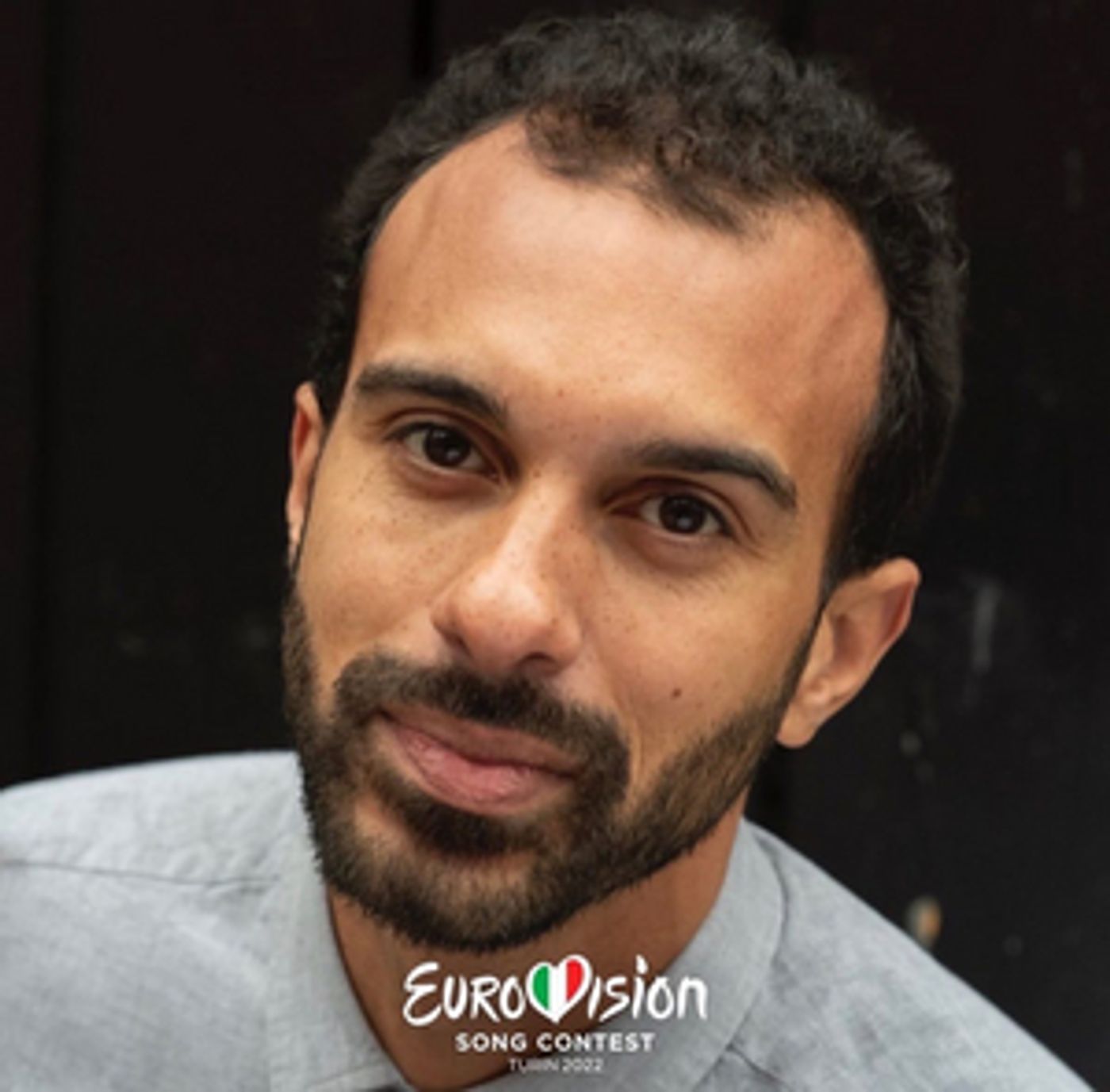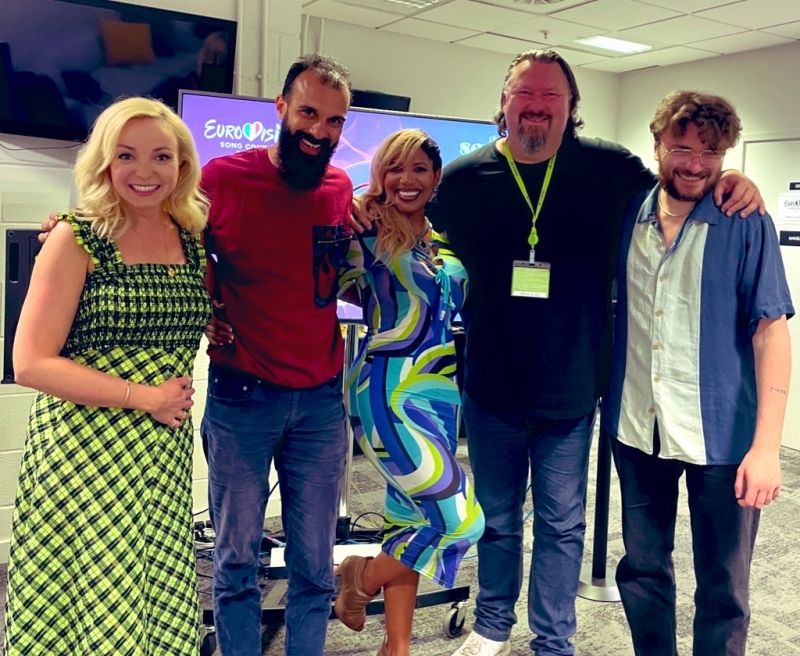Interview: Director Matthew Xia on the surprise of judging Eurovision and his future projects
The director, DJ and composer talks about the judging process, his favourite songs and how the Actors Touring Company is finally back on the road

When theatre director, DJ and composer Matthew Xia (also known as Excalibah) was approached to be on the UK's jury for the Eurovision Song Contest this year, nobody was more surprised than him. We caught up with him to chat about his experience of judging the Eurovision Class of 2022, as well as his future projects.
Did you have any personal or professional history with Eurovision?
Not really. I wasn't particularly into it, though I watched it with my grandad and mum when I was a kid. But as I got into hip-hop I found it a bit too cheesy. My main Eurovision memory after that was being put in a taxi early one night because I'd drunk too much at someone's Eurovision party!
So how did you get the gig as one of the five members of the UK's jury for Eurovision?
My agent just contacted me and said: "Hey Matthew, bit of a random one - Eurovision have invited you to be a jury member for the UK."
I admit my first response was: "No, I'm too busy." But my partner told me I'd be crazy to pass it up, so I wrote back and said: "Yes, let's go for it!"
I've tried to work out the triangulation for me being approached - I think it's probably to do with my radio history, the 2012 Paralympic opening ceremony in London [which he DJ-ed for] and musical theatre. They have to choose five people each year with a mix of backgrounds and lived experiences - just like a court jury.

With Matthew on this year's jury were Helen George [theatre and TV actor], the Scottish singer-songwriter Adam Hunter [from the band HYYTS, who have previously applied to represent the UK at Eurovision], Eliot Kennedy [who wrote "Everything Changes" for Take That as well as the music for Finding Neverland] and Denise Pearson [from 1980s pop sensations Five Star].
Meeting the other jurors was great. Five Star are the closest thing the UK has to the Jackson 5, and there was Denise Pearson sitting next to me, joking and asking if I wanted a glass of wine! It was fascinating hearing about their lives and work and finding points of connection. For example I'm currently working on a project with one of Helen George's best mates, and it turned out that Eliot Kennedy loves HYYTS' music!
And how did the judging process work?
We were given a handbook and a whole series of documentation, had an hour's worth of briefing by the BBC and Eurovision, and an adjudicator sitting in the corner keeping an eye on us!
We were told if there was a tie in our voting, the youngest jury member would have the deciding vote. I really liked that - it's because Eurovision was created as a post-war initiative, and young people represented the future.
The five of us sat in a room together and watched and judged the dress rehearsals - not the live televised shows that the public see. For both the second semi-final and the final, we each ranked the songs in our personal order of our preference, based on four criteria [vocal capacity; the performance on stage; composition and originality of the song; and the overall impression by the act].
We could discuss the songs - for example "Was that meant to be a wolf?" or "She has an incredible range" - but not anything about our preferences or how we'd score them all.
We also couldn't discuss with friends or family until the whole event was over - this is so nobody can try to sway you to vote a certain way. We were told that any funny business would mean the UK's act being immediately disqualified. So you definitely felt the responsibility!
The votes of six of this year's juries were thrown out amidst allegations that they agreed to exchange votes - do you have any thoughts on that?
I believe it, but I don't know how it's possible. There are five jury members in 40 countries, each going through the same secret process and it must be really hard to game that - my mind is blown by just how people would manage to do it.
Moving on to this year's Eurovision songs - did you listen to them before watching the jury shows?
No. I deliberately hadn't heard any of them other than the UK entry ["Space Man" by Sam Ryder] which my daughter absolutely loves, so they were all fresh to me. I wonder how it feels for fans who follow the contest more closely and live with the songs for weeks or months - you react differently to a known thing, I think.
And which songs stood out for you?
I'm a sucker for a guy with a high voice - I love a falsetto. So Poland [Ochman with "River"] and Azerbaijan [Nadir Rustamli with "Fade to Black"] scored high for me.
I also loved Sweden. She [Cornelia Jakobs with "Hold Me Closer"] reminded me of Cerys Matthews - raspy voice, solo singer-songwriter, and the way the song rose for the chorus. I loved the Greek and Italian songs [Amanda Tenfjord with "Die Together" and Mahmood & Blanco with "Brividi"]. I also loved Spain's entry - I remember seeing a tweet saying: "J Lo never could!" and thinking "absolutely!".
Ukraine [Kalush Orchestra with "Stefania", this year's winner] was very moving, even though I couldn't understand what they were singing, beyond it being about someone called Stefania, and the words "mama mama". For the songs not in English it was a case of going based on the feeling - we weren't given any translation of the lyrics.
I really didn't go for things that felt cheesy, even if I loved the song. For example "Give That Wolf A Banana" [by Norway's Subwoolfer] is a banger, but too ridiculous for me to rank it highly.
What was the most important element of the performances for you?
Originality, songwriting and vocal performance. You can always dress something up with dazzling costumes and staging, but it's the Eurovision Song Contest, not the Eurovision Performance Contest. So I tried to hold on to the songs, the musicality and the vocal ability and technique.
How do you think your background helped you to judge the performances?
I can write songs - I've written for pantos and musicals and trained in writing for musical theatre. When I was doing my radio show I had a thing I called the "15 Second Ear" where I could tell whether a song I'd been sent was interesting or unique, and decide quickly whether to put it on my show or play it in a club. That's essentially the job of a DJ, to be a filter.
Also working in musical theatre I've auditioned so many singers that I can recognise vocal technique and range, so I was listening for that too.
Why do you think the votes from the juries and the public are sometimes so different?
Because they're drunker than we are?! But actually we had fixed criteria to judge on. For example my partner loved Moldova's song ["Treneleţul" by Zdob şi Zdub & Advahov Brothers], but I didn't hear enough originality. I think the public are also more swayed by a gimmick.
The UK has really struggled at Eurovision in recent years - why do you think we did so much better this year [Sam Ryder came second overall]?
The song was really good! We've always said we did badly because nobody likes the UK politically, but this year we scored the highest for ages so it can't be just about politics. I think it's about the song writing - Sam and his team really tapped into something.
How can the UK continue to do well at the contest?
Put Sam in every year with the same song? Actually I think just take the song writing as seriously as possible, that seems to have worked this year.
What if anything would you change about Eurovision?
I'd make it a lot shorter [laughs]! It was a long night for us - the jury had to arrive at 6.30pm and we left around midnight. But I did have an absolute blast!
To be honest, I'd say the same about theatre - what would I do to make it better? Make it shorter. Ninety minutes, no interval - yes please!
That's a nice segue into talking about your theatrical endeavours! The Actor's Touring Company (ATC) has a global outlook and aims to bring international plays to UK audiences. Why do you think that's important?
When I took over in 2018, ATC had had an international remit for 20 years, but I felt it was quite western European focussed. There are a lot more stories and artists, in particular from the Global Majority: Asia, East & South East Asia, South America, Africa. I was also thinking about how I feel international - I have a Jamaican father and my DNA is from all over the world.
The UK is gloriously international, and I wanted to celebrate that. So we set out to find amazing existing work, and commission International Artists in the UK to tell their stories.
How did Covid impact your work?
Well we're called Actors Touring Company, and we couldn't quite own that middle word during the pandemic! In fact I've only just completed my first tour for the company, four years after being given the keys.
We did lots of housekeeping, made our board more representative of our work and target audiences, and expanded our staff team. We also moved from the ICA [Institute of Contemporary Arts] to Brixton House, which gives us better community access for our participatory work. It's a more authentic local community than Princess Charlotte and the kids of the people working at Westminster!
We also put a lot of energy into commissioning and developing plays and playwrights. One of those was Family Tree by Mojisola Adebayo, which went on to win the Alfred Fagon Award in 2021.
What are your current and future projects? Anything exciting for us to look out for?
The first one, that I've been trying to make for four years, is Tambo & Bones by Dave Harris, which will be on stage next summer. Tambo and Bones are historically the end men in a black and white minstrel show. These two characters realise they're in a minstrel show in 2023, and that the show's writer is getting rich by exploiting black pain and trauma for white audiences. So, they set out to exploit their own black pain and trauma to get rich themselves. The middle act is a hip-hop concert, then after a 400-year long interval you return to an Afro-futuristic lecture with robots. It's a show about the intersection of race and capitalism, a real journey - and it's also hilarious!
Away from ATC, I'm working with Francesca Moodie Productions on a new one person show by Marcela dos Santos, starring Samuel Barnett as a stand-up comedian who struggles to find authenticity and carries around a big red self-sabotage button.
I'm also working on a big project with Vikki Stone for Kenny Wax Family Entertainment. That will be a stage adaptation of a well-known series for 2-6 year-olds!
It's a nice mix of projects - I've been aware for a while that I don't just want to be "the dude who does plays about race". I understand audiences and stagecraft, and I want to make work for children and adults, including comedy, drama, musicals - everything!
Tambo and Bones will be at Theatre Royal Stratford East from 16 June - 15 July 2023.
Photo Credits: Matthew Xia
Videos

